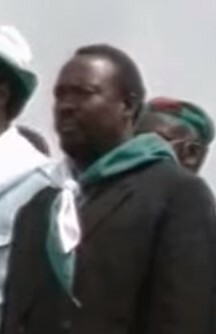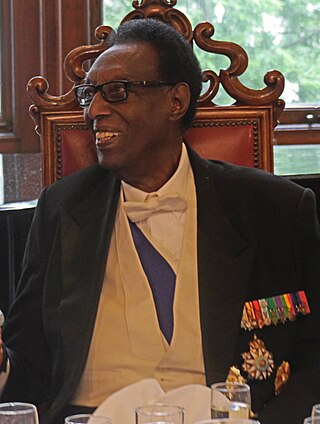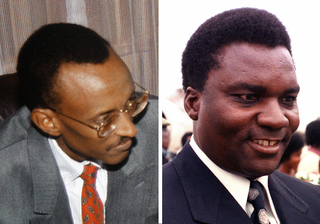 |
|---|
The Association for Social Promotion of the Masses (French : Association pour la promotion sociale de la masse, APROSOMA) was a political party in Rwanda.
 |
|---|
The Association for Social Promotion of the Masses (French : Association pour la promotion sociale de la masse, APROSOMA) was a political party in Rwanda.
The party was established on 15 February 1959 by Joseph Gitera Habyarimana alongside friends and former schoolmates. [1] Although it initially promoted social improvement for both Hutu and Tutsi, it later became an anti-Tutsi party. [2]
APROSOMA contested the pre-independence elections in 1961, receiving 3.6% of the vote and winning two seats. In 1965 the country became a one-party state under MDR-Parmehutu. [3]
Human occupation of Rwanda is thought to have begun shortly after the last ice age. By the 11th century, the inhabitants had organized into a number of kingdoms. In the 19th century, Mwami (king) Rwabugiri of the Kingdom of Rwanda conducted a decades-long process of military conquest and administrative consolidation that resulted in the kingdom coming to control most of what is now Rwanda. The colonial powers, Germany and Belgium, allied with the Rwandan court.
The Hutu, also known as the Abahutu, are a Bantu ethnic group which is native to the African Great Lakes region. They mainly live in Rwanda, Burundi, and Uganda where they form one of the principal ethnic groups alongside the Tutsi and the Great Lakes Twa.

Juvénal Habyarimana was a Rwandan politician and military officer who was the second president of Rwanda, from 1973 until his assassination in 1994. He was nicknamed Kinani, a Kinyarwanda word meaning "invincible".

Cyprien Ntaryamira was a Burundian politician who served as President of Burundi from 5 February 1994 until his death two months later. A Hutu born in Burundi, Ntaryamira studied there before fleeing to Rwanda to avoid ethnic violence and complete his education. Active in a Burundian student movement, he cofounded the socialist Burundi Workers' Party and earned an agricultural degree. In 1983, he returned to Burundi and worked agricultural jobs, though he was briefly detained as a political prisoner. In 1986 he cofounded the Front for Democracy in Burundi (FRODEBU), and in 1993 FRODEBU won Burundi's general elections. He subsequently became the Minister of Agriculture and Animal Husbandry on 10 July, but in October Tutsi soldiers killed the president and other top officials in an attempted coup.

The Rwandan genocide, also known as the genocide against the Tutsi, occurred from 7 April to 19 July 1994 during the Rwandan Civil War. Over a span of around 100 days, members of the Tutsi ethnic group, as well as some moderate Hutu and Twa, were systematically killed by Hutu militias. While the Rwandan Constitution states that over 1 million people were killed, most scholarly estimates suggest between 500,000 and 662,000 Tutsi died. The genocide was marked by extreme violence, with victims often murdered by neighbors, and widespread sexual violence, with between 250,000 and 500,000 women raped.

Kigeli V Ndahindurwa was the last ruling King (Mwami) of Rwanda, from 28 July 1959 until the end of the UN-mandate with Belgian administration and the declaration of an independent Republic of Rwanda 1 July 1962. On 25 September 1961, a referendum voted for the abolition of the Rwandan monarchy following the Rwandan Revolution.

Mutara III Rudahigwa was King (umwami) of Rwanda between 1931 and 1959. He was the first Rwandan king to be baptised, bringing Catholicism to the country. His Christian name was Charles Léon Pierre and he is sometimes referred to as Charles Mutara III Rudahigwa.

Grégoire Kayibanda was a Rwandan politician and revolutionary who was the first elected President of Rwanda from 1962 to 1973. An ethnic Hutu, he was a pioneer of the Rwandan Revolution and led Rwanda's struggle for independence from Belgium, replacing the Tutsi monarchy with a republican form of government. Rwanda became independent from Belgium in 1962, with Kayibanda serving as the country's first president, establishing a pro-Hutu policy and a de facto one-party system governed by his party, Parmehutu. He was overthrown in a coup d'état in 1973 by his defense minister, Juvénal Habyarimana, and died three years later.

The National Revolutionary Movement for Development was the ruling political party of Rwanda from 1975 to 1994 under President Juvénal Habyarimana, running with first Vice President Édouard Karemera. From 1978 to 1991, the MRND was the only legal political party in the country. It was dominated by Hutus, particularly from President Habyarimana's home region of Northern Rwanda. The elite group of MRND party members who were known to have influence on the President and his wife are known as the akazu. In 1991, the party was renamed the National Republican Movement for Democracy and Development.

The Rwandan Civil War was a large-scale civil war in Rwanda which was fought between the Rwandan Armed Forces, representing the country's government, and the rebel Rwandan Patriotic Front (RPF) from 1 October 1990 to 18 July 1994. The war arose from the long-running dispute between the Hutu and Tutsi groups within the Rwandan population. A 1959–1962 revolution had replaced the Tutsi monarchy with a Hutu-led republic, forcing more than 336,000 Tutsi to seek refuge in neighbouring countries. A group of these refugees in Uganda founded the RPF which, under the leadership of Fred Rwigyema and Paul Kagame, became a battle-ready army by the late 1980s.

The Kingdom of Rwanda was a Bantu kingdom in modern-day Rwanda, which grew to be ruled by a Tutsi monarchy. It was one of the oldest and the most centralized kingdoms in Central and East Africa. It was later annexed under German and Belgian colonial rule while retaining some of its autonomy. The Tutsi monarchy was abolished in 1961 after ethnic violence erupted between the Hutu and the Tutsi during the Rwandan Revolution which started in 1959. After a 1961 referendum, Rwanda became a Hutu-dominated republic and received its independence from Belgium in 1962.
The Hutu Emancipation Movement Party, also known as the Republican Democratic Movement – Parmehutu, was a political party in Rwanda. The movement emphasised the right of the majority ethnicity to rule and asserted the supremacy of Hutus over Tutsis. It was the most important party of the "Hutu Revolution" of 1959–61 that led to Rwanda becoming an independent republic and Hutus superseding Tutsis as the ruling group.
The Groupe Scolaire Officiel de Butare (GSOB) Indatwa n’inkesha, also known as the Indatwa n'Inkesha School, is a historic secondary school in Huye District in Butare, Rwanda. As well as being the oldest secondary school in the country, it is regarded as one of the most prestigious and successful public schools in Rwanda.

Kigeli IV Rwabugiri was the king (mwami) of the Kingdom of Rwanda in the mid-nineteenth century. He was among the last Nyiginya kings in a ruling dynasty that had traced its lineage back four centuries to Gihanga, the first 'historical' king of Rwanda whose exploits are celebrated in oral chronicles. He was a Tutsi with the birth name Sezisoni Rwabugiri. He was the first king in Rwanda's history to come into contact with Europeans. He established an army equipped with guns he obtained from Germans and prohibited most foreigners, especially Arabs, from entering his kingdom.

The Constitution of Rwanda was adopted by referendum on May 26, 2003. It replaced the Constitution of 1991.

The largest ethnic groups in Rwanda are the Hutus, which make up about 85% of Rwanda's population; the Tutsis, which are 14%; and the Twa, which are around 1%. Starting with the Tutsi feudal monarchy rule of the 10th century, the Hutus were a subjugated social group. Belgian colonization also contributed to the tensions between the Hutus and Tutsis. The Belgians and later the Hutus propagated the myth that Hutus were the superior ethnicity. The resulting tensions would eventually foster the slaughtering of Tutsis in the Rwandan genocide. Since then, policy has changed to recognize one main ethnicity: "Rwandan".

The cuisine of Rwanda is based on local staple foods produced by the traditional subsistence-level agriculture and has historically varied across different areas.

The Rwandan Revolution, also known as the Hutu Revolution, Social Revolution, or Wind of Destruction, was a period of ethnic violence in Rwanda from 1959 to 1961 between the Hutu and the Tutsi, two of the three ethnic groups in Rwanda. The revolution saw the country transition from a Tutsi monarchy under Belgian colonial authority to an independent Hutu-dominated republic.

Nyamata is a town and sector in the Bugesera District, southeastern Rwanda. Nyamata literally means 'place of milk' from the two Kinyarwanda words nya- 'of' and amata 'milk'. It is the location of the Nyamata Genocide Memorial, commemorating the Rwandan genocide of 1994.
In the Rwandan Revolution, the coup of Gitarama was an event which occurred on 28 January 1961 in which the monarchy in Rwanda, then a part of the Belgian mandate of Ruanda-Urundi, was abolished and replaced with a republican political system. The traditional monarchy was led by a Mwami (king), who ruled through an administration of chiefs and subchiefs in the context of a feudal system of patron-client relations based on tribute. The Mwami and most of his chiefs were members of the Tutsi ethnic minority, a group which wielded considerable social, political economic power. Of subordinate status to the Tutsis was the Hutu ethnic majority. As part of their rule, the Belgians institutionalised a racial hierarchy which favoured the Tutsis at the expense of the Hutus.